Dogs
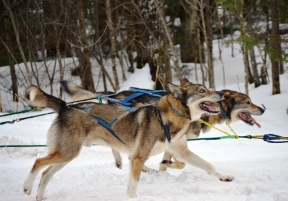
By Linda Cole
Animals are such amazing creatures, and we can learn a lot from their attitude about a disability. Life continues, regardless of what happened to cause a disability. I grew up with someone who had a debilitating disability, and I've also dealt with a dog that was deaf and blind. I learned from my mom and my dog that the best way to live with a disability is to simply keep on living the best you can. So when I run across stories that exemplify courage and determination, in disabled humans or dogs, they catch my attention. Gonzo, an eight year old Alaskan Husky, is blind but he continues to run with his team pulling a dog sled, with a little help from his brother, Poncho.
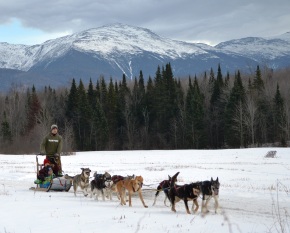 What sled dog wouldn't love to have the entire New Hampshire North country as their playground? Sled dogs are born to run, and pulling a sled isn't work to them, it's play. So what do you do with a sled dog that develops a disability? In the case of Gonzo, when it was discovered he was losing his sight, his vet recommended hooking him up to a sled and continuing to run him.
What sled dog wouldn't love to have the entire New Hampshire North country as their playground? Sled dogs are born to run, and pulling a sled isn't work to them, it's play. So what do you do with a sled dog that develops a disability? In the case of Gonzo, when it was discovered he was losing his sight, his vet recommended hooking him up to a sled and continuing to run him.
Gonzo's life changed three years ago when kennel manager Ben Morehouse noticed the dog tripping over his food bowl. After a variety of failed treatments, everyone realized the dog would soon be blind, and there was nothing they could do to stop it. But Gonzo is a sled dog, and he couldn't wait to get back on the trail with his team. He wasn't going to let a little thing like no sight stop him from enjoying life.
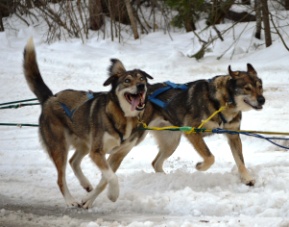 He may be blind, but Gonzo knows when the team is being hooked up, and he isn't about to be left behind. His desire to run is just as strong as it was when he could see. Gonzo and Poncho are harnessed side by side toward the back of the eight dog team. At first, Poncho wasn't aware there was anything wrong with his brother, and treated him just like normal. When Gonzo began to lean on him when they came to turns, it bothered him at first and he'd get grumpy with his brother. But it wasn't long before he realized Gonzo needed his help, and figured out he was leaning on him to get a feel of how fast they were running and where the turns were at.
He may be blind, but Gonzo knows when the team is being hooked up, and he isn't about to be left behind. His desire to run is just as strong as it was when he could see. Gonzo and Poncho are harnessed side by side toward the back of the eight dog team. At first, Poncho wasn't aware there was anything wrong with his brother, and treated him just like normal. When Gonzo began to lean on him when they came to turns, it bothered him at first and he'd get grumpy with his brother. But it wasn't long before he realized Gonzo needed his help, and figured out he was leaning on him to get a feel of how fast they were running and where the turns were at.
Now, the brothers nudge each other with their heads and noses in their own special way of communicating with each other. When Gonzo is running, he uses his sense of hearing, touch and smell to help him navigate. He's adapted to his disability and instead of watching a trail he can't see, he pokes his nose into the wind and tilts his head to listen. Very few dogs would allow another dog to invade his personal space the way Poncho has allowed Gonzo to do.
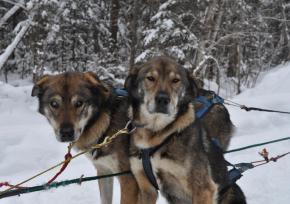 One spring day, the team was out on a trail known for deep snow. At one point, Gonzo got too close to the edge of the trail and stumbled in the deep snow. As the team continued to move, Poncho grabbed Gonzo by his harness with his teeth, picked him up out of the snow and pulled him back onto the trail – all while in full stride! Kennel owner Neil Beaulieu said, “I've run dogs in a lot of places, all over the country, and it was the most amazing thing I've ever seen sled dogs do.”
One spring day, the team was out on a trail known for deep snow. At one point, Gonzo got too close to the edge of the trail and stumbled in the deep snow. As the team continued to move, Poncho grabbed Gonzo by his harness with his teeth, picked him up out of the snow and pulled him back onto the trail – all while in full stride! Kennel owner Neil Beaulieu said, “I've run dogs in a lot of places, all over the country, and it was the most amazing thing I've ever seen sled dogs do.”
Beaulieu takes in retired sled dogs and rescued sled dogs, some that were living in bad situations. Muddy Paw Sled Dog Kennel, where Gonzo and Poncho were born, is also a no-kill shelter. They give sled tours, 20 minute trips and 50 mile overnight trips to raise money to help support the kennel that houses 120 dogs. Beaulieu's desire is to find forever homes for the rescued and retired dogs. His commitment to the dogs that aren't adopted is a home and a job for the rest of their life.
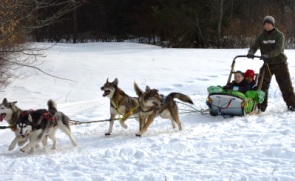 The Alaskan Husky isn't a specific breed, it's a type of dog. It is, however, a true sled dog developed by mushers who cross-bred Inuit village dogs with the Eskimo dog, Siberian Husky, German Shorthaired Pointer and Greyhound to create a dog that met their needs. There is no specific breed standard, and the Alaskan Husky isn't recognized by any kennel club. Breeding is based only on the working quality of the dog, and how he looks isn't important, which allows for a wide variety in looks.
The Alaskan Husky isn't a specific breed, it's a type of dog. It is, however, a true sled dog developed by mushers who cross-bred Inuit village dogs with the Eskimo dog, Siberian Husky, German Shorthaired Pointer and Greyhound to create a dog that met their needs. There is no specific breed standard, and the Alaskan Husky isn't recognized by any kennel club. Breeding is based only on the working quality of the dog, and how he looks isn't important, which allows for a wide variety in looks.
The Alaskan Husky is an intelligent, strong and friendly dog. They have plenty of stamina and love to run. The breed is a little bigger than a Siberian Husky, with a leaner body, shorter coat and longer legs. Denali National Park and Reserve has had their own breeding program of Alaskan Huskies since the beginning of the park, and they use teams of sled dogs to patrol the back country during the winter months to protect the land and wildlife living in the park.
Photos courtesy of Muddy Paw Sled Dog Kennel
Read more articles by Linda Cole
- Training Information On Sled Dogs In The Iditarod Race
The first annual 1,150-mile Iditarod was run in 1973 from Anchorage in south central Alaska to Nome on the western coast. Called the "Last Great Race on Earth," a shorter version was run in 1967 as part of Alaska's centennial year celebrations, and...
- Most Popular Dog Breeds By States
By Linda Cole Many people who love dogs have one or two specific breeds they favor over other breeds. I've always loved the Siberian Husky and felt blessed to be owned by two of them at one time. My other preference would be a German Shepherd or...
- The Sled Dogs Of Denali National Park
By Linda Cole Photo by NPSSled dogs have always had a place in the wilds of Alaska. Snowmobiles may have replaced dogs in Alaska for the most part, but mushing is still a good way to get around in winter, and it's the only mode of transportation allowed...
- Do They Still Use Sled Dogs In Alaska?
By Linda Cole Alaska is a land that has not changed a lot over the years. Since joining the union in 1959, it is still one of the states with the lowest population. It's a land of beauty with mystery hidden in the landscape and behind every snowy...
- The Story Of Balto Is A Tribute To All Dogs
By Linda Cole Every now and then an exceptional dog rises above expectations. Balto was such a dog, who despite difficult odds guided a life saving dog sled team into Nome, Alaska in 1925 after a diphtheria epidemic threatened to wipe out the entire...
Dogs
Blind Sled Dog Continues to Run with the Team

By Linda Cole
Animals are such amazing creatures, and we can learn a lot from their attitude about a disability. Life continues, regardless of what happened to cause a disability. I grew up with someone who had a debilitating disability, and I've also dealt with a dog that was deaf and blind. I learned from my mom and my dog that the best way to live with a disability is to simply keep on living the best you can. So when I run across stories that exemplify courage and determination, in disabled humans or dogs, they catch my attention. Gonzo, an eight year old Alaskan Husky, is blind but he continues to run with his team pulling a dog sled, with a little help from his brother, Poncho.

Gonzo's life changed three years ago when kennel manager Ben Morehouse noticed the dog tripping over his food bowl. After a variety of failed treatments, everyone realized the dog would soon be blind, and there was nothing they could do to stop it. But Gonzo is a sled dog, and he couldn't wait to get back on the trail with his team. He wasn't going to let a little thing like no sight stop him from enjoying life.

Now, the brothers nudge each other with their heads and noses in their own special way of communicating with each other. When Gonzo is running, he uses his sense of hearing, touch and smell to help him navigate. He's adapted to his disability and instead of watching a trail he can't see, he pokes his nose into the wind and tilts his head to listen. Very few dogs would allow another dog to invade his personal space the way Poncho has allowed Gonzo to do.

Beaulieu takes in retired sled dogs and rescued sled dogs, some that were living in bad situations. Muddy Paw Sled Dog Kennel, where Gonzo and Poncho were born, is also a no-kill shelter. They give sled tours, 20 minute trips and 50 mile overnight trips to raise money to help support the kennel that houses 120 dogs. Beaulieu's desire is to find forever homes for the rescued and retired dogs. His commitment to the dogs that aren't adopted is a home and a job for the rest of their life.

The Alaskan Husky is an intelligent, strong and friendly dog. They have plenty of stamina and love to run. The breed is a little bigger than a Siberian Husky, with a leaner body, shorter coat and longer legs. Denali National Park and Reserve has had their own breeding program of Alaskan Huskies since the beginning of the park, and they use teams of sled dogs to patrol the back country during the winter months to protect the land and wildlife living in the park.
Photos courtesy of Muddy Paw Sled Dog Kennel
Read more articles by Linda Cole
- Training Information On Sled Dogs In The Iditarod Race
The first annual 1,150-mile Iditarod was run in 1973 from Anchorage in south central Alaska to Nome on the western coast. Called the "Last Great Race on Earth," a shorter version was run in 1967 as part of Alaska's centennial year celebrations, and...
- Most Popular Dog Breeds By States
By Linda Cole Many people who love dogs have one or two specific breeds they favor over other breeds. I've always loved the Siberian Husky and felt blessed to be owned by two of them at one time. My other preference would be a German Shepherd or...
- The Sled Dogs Of Denali National Park
By Linda Cole Photo by NPSSled dogs have always had a place in the wilds of Alaska. Snowmobiles may have replaced dogs in Alaska for the most part, but mushing is still a good way to get around in winter, and it's the only mode of transportation allowed...
- Do They Still Use Sled Dogs In Alaska?
By Linda Cole Alaska is a land that has not changed a lot over the years. Since joining the union in 1959, it is still one of the states with the lowest population. It's a land of beauty with mystery hidden in the landscape and behind every snowy...
- The Story Of Balto Is A Tribute To All Dogs
By Linda Cole Every now and then an exceptional dog rises above expectations. Balto was such a dog, who despite difficult odds guided a life saving dog sled team into Nome, Alaska in 1925 after a diphtheria epidemic threatened to wipe out the entire...
